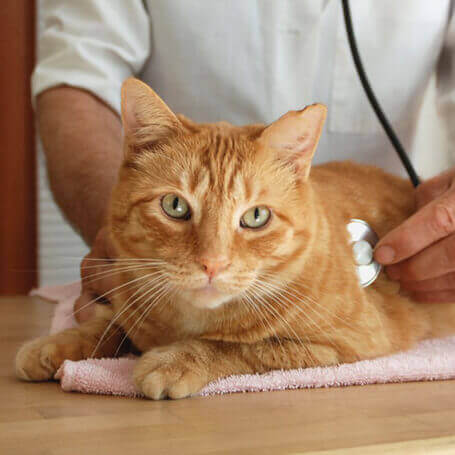
At ACVH we give a full examination when your pet comes in for its vaccinations. We strongly feel that annual exams can be used as a first step diagnostic tool. Our pets age faster than we do, and unfortunately, cannot convey many symptoms to us directly.
Physical exams can be used to evaluate several issues including (but not limited to): nerve deficits, back pain/disc disease, orthopedic disease, dental disease, heart murmurs, mass development, and even more subtle changes that can key us into more serious disease processes. Changes in appetite and energy level can also key us into aging changes that are difficult to notice when you see your dog every day.
Keeping regular and accurate track of your pet’s health will help us catch early signs and health concerns before they become a major problem. If any concerns arise from your yearly appointment, there is still always time to take X-rays or run any blood work that may be indicated by exam findings or concerns you have noticed at home.
This is also the perfect time to ask any questions about your pet or their health that our doctors can address either in the appointment or they can make a treatment plan with you that may be carried out at home.
Flea & Tick Control
Many pets spend time outside whether out for a routine bathroom break, a walk, a day at the dog park, a hike, or out for a hunting trip. These outings are great activities for your pet but also bring with them the risk of flea and tick infestation.
Fleas and ticks can be very damaging to your pet’s health and carry with them harmful diseases. Many of these critters can survive the cold winter and are just waiting for a day when it is warm enough to venture out and find a host to munch on. Flea/tick preventatives can and should be given year-round to keep your pet safe.
At the very least, these infestations make our pets very uncomfortable and can be spread to other animals on or near the property. There are many options out there and we can help you choose the one that is best for you and your beloved pet.
Heartworm Disease
Fortunately for us out here in the Hills, there is a fairly low prevalence of heartworm disease, but that does not make the infection any less dangerous. Heartworms are transmitted by mosquitos and get into your pet’s bloodstream. They make their way to the heart where the adults will reside. That literally means there are worms living inside one of the most vital organs in their body.
The treatment is expensive and dangerous itself since it means we have to kill off worms while they are still inside the heart. That is why prevention is so important. It takes a simple (often oral) dose of very well researched medication (we use Heartgard) to keep your pet’s heart free of worms.
There is a simple, quick, and easy test that we can run any time to make sure your pet is free of heartworms which we recommend yearly.
Parasite Control
Like the vaccine protocols, parasite control is a part of preventative medicine that can be tailored to your individual pet. The environment(s) where your pet spends its time and travel habits will help us to choose the product that is best for your pet.
We do not carry any products that we would not use in our own pets and we can recommend others if we do not have what is best for your pet in-house. If your pet already has signs of parasite infection, we can also offer you tests to confirm and identify the specific cause.
Microchips
Although not used to prevent disease or maintain wellness per se, we offer microchips that can be used to identify your pet should he/she ever get loose or lost. These chips are implanted under the skin and can be done awake or as a part of any procedure that requires sedation.
If your pet gets picked up by animal control, taken to a local humane society, or dropped off at any local veterinary hospital, a simple scanner can check for a microchip. These chips are registered in databases that can be accessed. As long as your information is kept up to date, a simple phone call can reconnect you with your pet.
Vaccinations
A major component of preventative medicine is making sure your pets are up to date on all of their necessary vaccinations. These can help prevent very serious, sometimes fatal diseases in your pet. You and your pets live in an environment, participate in activities, and travel in a lifestyle unique to you.
At ACVH we follow the American Veterinary Medical Association guidelines for vaccines, but also offer non-core vaccines that may protect your pet from certain exposures unique to him. Vaccinations start at 6-8 weeks of age and boosters are given every 3-4 weeks for a series. After which many vaccines shift to a yearly (or every 2 years) basis.
The needs of your pet may even change from year to year, but we are always ready to discuss any concerns you have or offer any changes that may benefit your pet. We are constantly working to stay current with the research that tells us how to offer your pet the best care, using safe and effective products.
